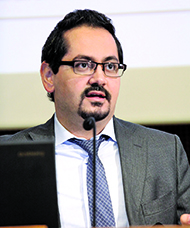A Conversation with Arkan El Seblani
Photo Credit: Arab Forum of Anti-Corruption Agencies & Financial Intelligence Units
Arkan El Seblani manages the United Nations Development Programme (UNDP) regional anti-corruption initiative in the Arab States. With his experience in private practice as a legal specialist in Lebanon, the United States and Qatar, coupled with more than 12 years’ experience with the UN, Mr. El Seblani brings a level of expertise to his work that uniquely qualifies him to address corruption as well as rule of law issues throughout the region.
During CIPE’s discussion with Mr. El Seblani, he outlined how UNDP supports anti-corruption reform as part of its work to enable the 2030 Agenda on Sustainable Development, including through the actualization of the UN Convention against Corruption: Prevention, Criminalization, International Cooperation, and Asset Recovery. UNDP believes that effectively battling corruption involves many actors across civil society, business and government. UNDP invests in networks and people to create informed demand for a national anti-corruption agenda, while also supporting policy dialogue and targeted training on the supply side. The initiative that Mr. El Seblani is currently leading focuses on prevention, including in specific sectors such as health and customs, through legal reform efforts, public education outreach, risk management, and most recently behavioral insights.
Too often, complex governance agendas with overly technical terminology and jargon dilute even the most effective anti-corruption efforts, as it becomes a source of disconnect with the public. Legalistic approaches that overemphasize criminalization and enforcement like criminal prosecutions of offenders, are often favored by citizens and public officials alike as it suggests accountability. Though this approach demonstrates commitment to corruption crackdowns, it can prove challenging to achieve when there is limited capacities and resources on the ground. It can also be quite controversial in countries where rule of law is weak and prosecution appears arbitrary or politically motivated. Strong political will and adequate technical capacity is indispensable for sustainable success.
It is also important to acknowledge the limitations of legalistic approaches and invest in corruption prevention as well. Complicating reform efforts around effective prevention strategies is the absence of adequately specialized tools and the persistent lack of trust between the business community and government, and the business community and civil society. Many citizens look at the business sector as the ‘bad guy’ and do not trust them to set or comply with anti-corruption standards. Trust then, is a key factor in changing the pervasiveness of corruption – trust must be built into national anti-corruption reforms. UNDP has begun working with business associations in the Middle East and North Africa to help facilitate dialogue with anti-corruption agencies and members of civil society. There is still much progress to be made, but new programs in countries like Kuwait, Tunisia, Morocco, and Iraq are demonstrating promise.
Mr. El Seblani ended his discussion with two insightful quotes:
“Politicians do not see the light, they feel the heat.”
“The UN is people and systems; the people working in the field are a product of their environment.”
The way forward requires trust among stakeholders, innovative approaches to preventing and combatting corruption, and ultimately investment in people – they hold the key to real change.
Maggie Langlais is an Anti-Corruption fellow at the Center for International Private Enterprise (CIPE)

